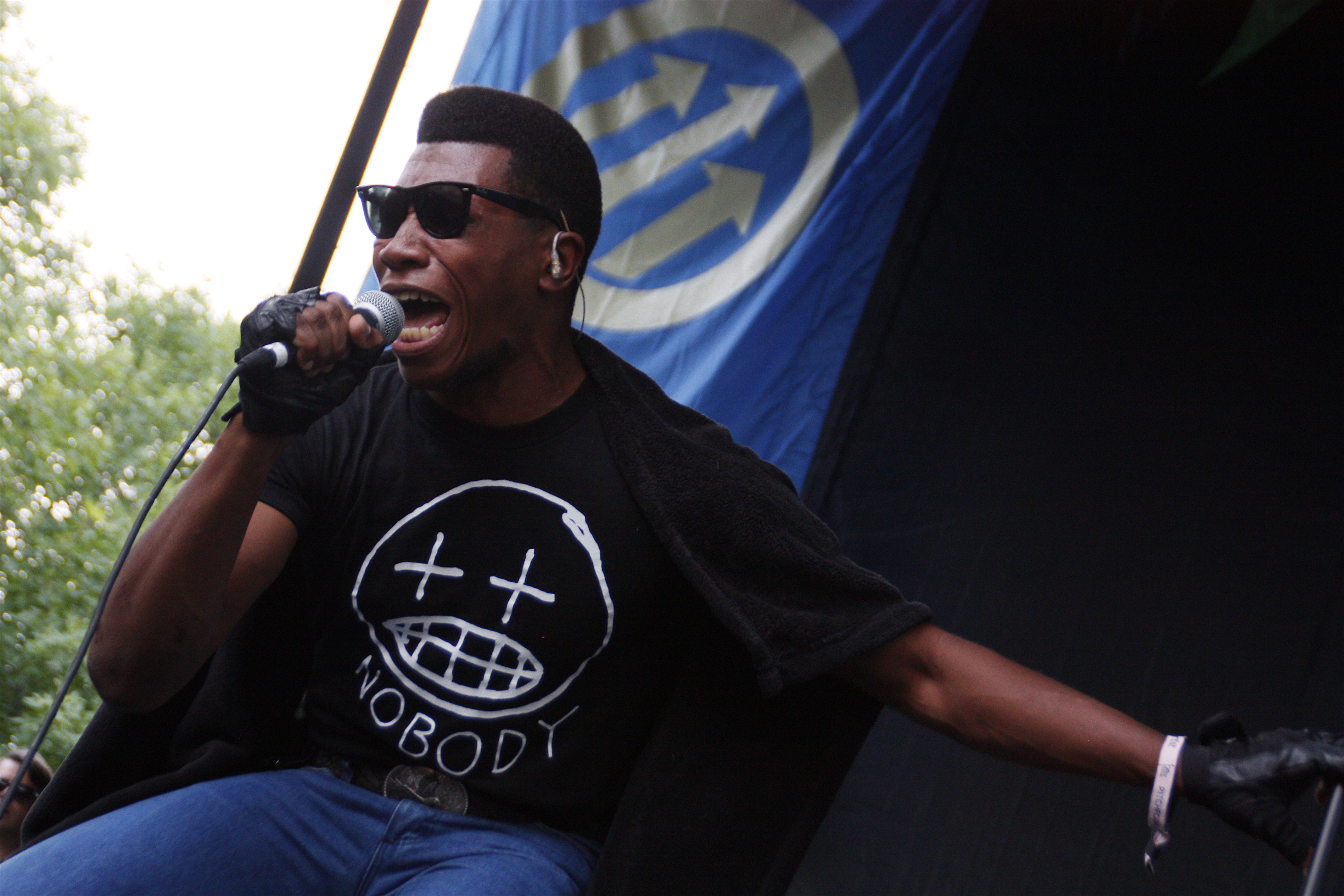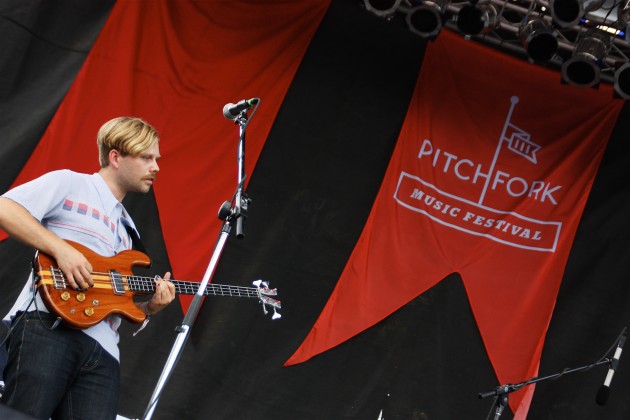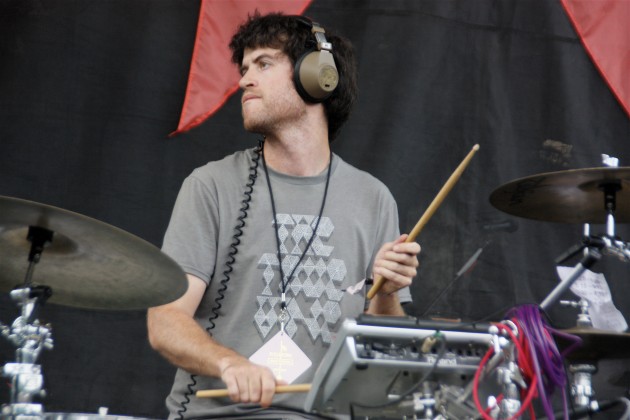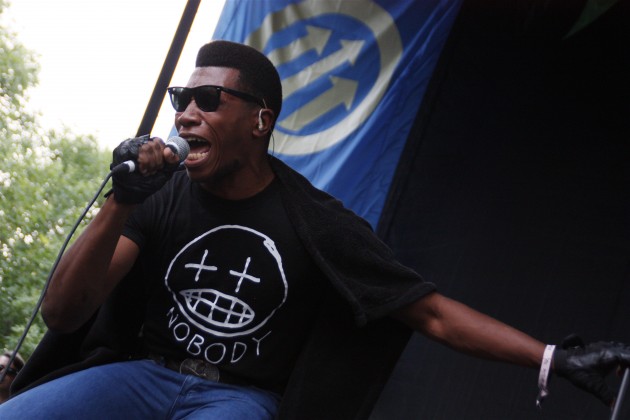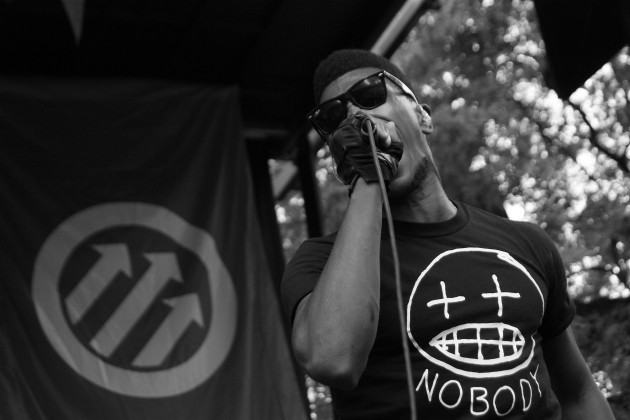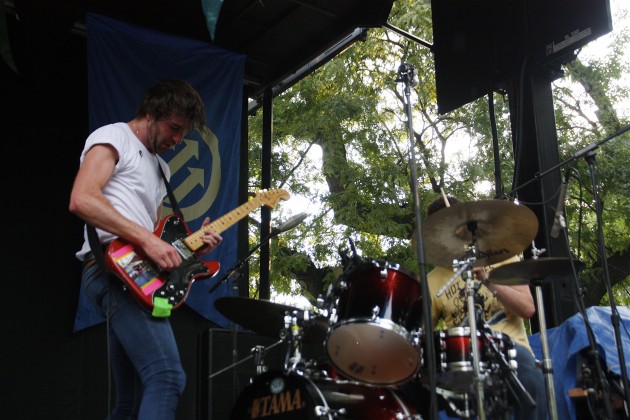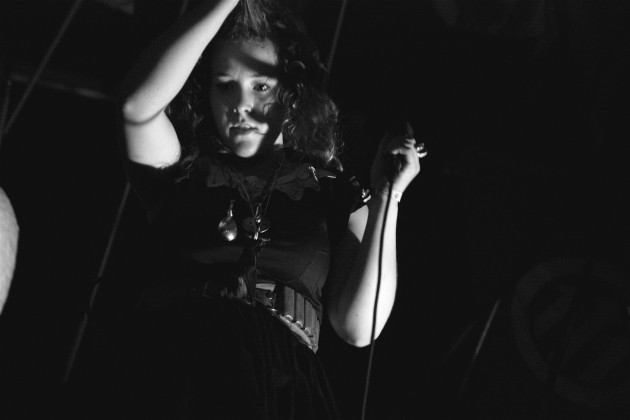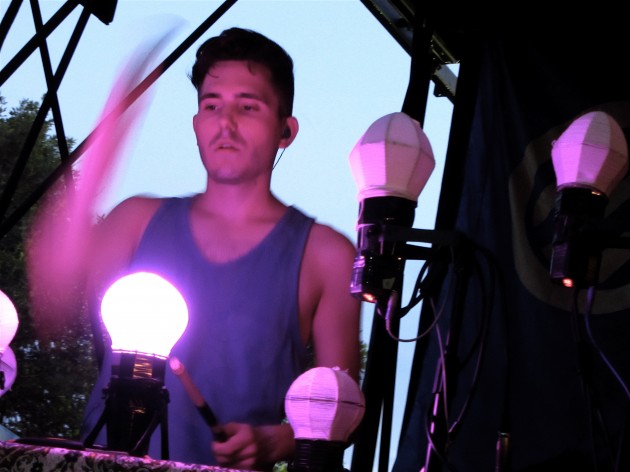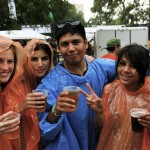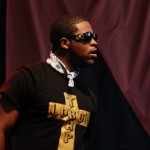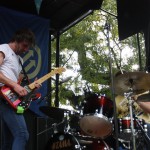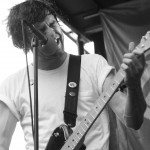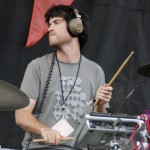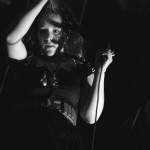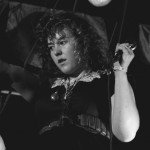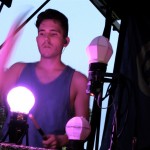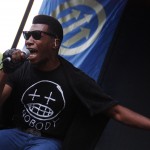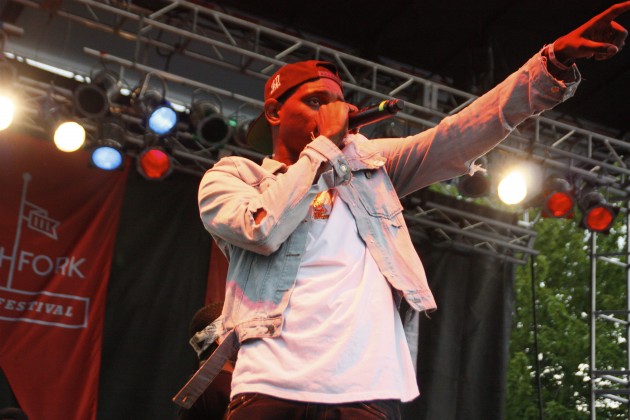
All photos by Christopher Alvarez
This is the third straight year BPM has covered Pitchfork’s annual three day musical festival in Union Park, Chicago. During that time, the festival has grown immensely in terms of popularity while still maintaining its eclecticism and accessibility. While indie rock has been and remains the main focus, electronic and hip-hop are also spotlighted. With few exceptions – most notably Modest Mouse’s 2010 headline slot – Pitchfork has stayed away from artists in their “nostalgia” phase (Pavement gets a pass for giving one of the all-time great Pitchfork Music Festival performances). Indeed, this music festival is a place where newer acts can find valuable footing with the indie crowd, often times as a prelude to returning years later as fest headliners. Such is the case again for the 2012 addition, with Vampire Weekend and Japandroids among others returning to Union Park.
However, this year’s big change is how much less star power is present on the lineup card. Many of this year’s acts wouldn’t profile as more than stage openers in previous years. This makes Pitchfork fairly top-heavy. It also forces patrons to take a “search and discover” approach similar to that of SXSW. While Pitchfork does offer three full days of performances, it’s not nearly that large. That leaves little margin for error for a festival that has recently done very little wrong.
Further complicating matters, the weather on Friday was dreadful. Torrential downpours before the gates opened and frequently throughout the day insured the grounds were muddy and slippery. While kudos to the festival staff for quickly wrapping up the stage gear, all the stages experienced performance start time push backs. Even more shows than usual had to overlap, making not only sound a problem but also forcing patrons to make more sacrifices.
Outer Minds
Outer Minds represents two things that Pitchfork includes at each of their festivals: a Chicago act to pacify the locals and a psychedelic pop act to set the tenor. In recent years the Fresh & Onlys and Woods performed admirably in this capacity. While those groups echoed the Grateful Dead and the Byrds respectively, Outer Minds’ sound pulls greatly from the Zombies.

While the band was saddled with the bad weather and forced to play at the blue stage – basically Pitchfork’s version of the kids’ table – they drew well. Lead singer and guitarist Zach Medearis was flanked throughout by the female vocal duo of Mary McKane (also on keyboards) and Gina Lira. Together their vocal harmonies provided the first highlight of the fest. Unlike many bands who overuse the vocal echo effect, Outer Minds employ it with restraint and artfulness. On “Gimme A Reason,” the band recalls the Small Faces circa Ogden’s Nut Gone Flake. The song’s airy with splashes of psychedelia fortify what is at the core a great pop tune. The band played many more tracks off their Southpaw LP, such as set highlight “Always In My Head” which includes a fantastic drum breakdown section before building back into the final chorus.
Lower Dens
Lower Dens’ set came during a brief break in the monsoon, but the group did little to capitalize. Playing in front of a modest crowd (especially in comparison to Outer Minds), frontwoman Jana Hunter and her crew played through several lengthy krauty jams that left little impact on the audience. While it would be unfair to expect the Baltimore group to “rev up” a festival crowd, the performances were limp and shapeless. It was never entirely clear where the group were trying to go with their sound. They alternated, generally within the same song/jam, between what could pass for an ominous movie soundtrack to relatively speaking sunnier territory. Concerning the latter, Beach House do it better, and will come Sunday. It’s hard to say with any confidence that this performance will be remembered fondly.
Willis Earl Beal
If you’re like me, you know Willis Earl Beal from his “Call me and I’ll sing you a song, write to me and I’ll draw you a picture” flyer gimmick and the overrated Acousmatic Sorcery album from earlier this year. That’s a pretty low bar to clear, and yet I felt confident Beal’s blue stage show would end up with the rest of his junk.
Mr. Beal, I owe you an apology. I shouldn’t have dismissed you like that. While I still don’t care for his album, Beal is a captivating showman live. “You’ve been very patient watching me be self-indulgent” Beal commented while sipping on what appeared to be Crown Royal. Wailing like a tortured in hell Otis Redding, Beal powered through several of his blues gospel cuts. Beal can be frightening and intimidating. He defiantly proclaimed that the festival’s folk and rock acts “don’t make no goddamn sense” while thanking the audience for “letting me sing real songs.” That heavy handed approach works with Beal, as his entire character is loud and outlandish. He did reveal a tender side to his personality on some slower cuts, so at least he’s not a one trick pony.
The Olivia Tremor Control
More than any other act playing Friday at Pitchfork, the Olivia Tremor Control were disadvantaged by the weather and Pitchfork’s own tech problems. The sound system seemed to be on the fritz, as the volume alternated randomly between too quiet and far, far too loud. That, along with the dominantly gray overcast, really took away from the group’s signature Laurel Canyon-inspired pop. This further emphasizes a concern with this year’s festival: why is an act like Purity Ring given a stage headline slot when a decorated band like the Olivia Tremor Control made to perform at 4:35 before the crowd has really arrived at Union Park? It’s mindboggling.
Still, the group did manage to shine through the conditions at times. Music From The Unrealized Film Script, Dusk At Cubist Castle highlights “Define A Transparent Dream” and “The Opera House” got what little crowd was there into a frenzy, and anytime you can see a tuba alongside a moog at a rock show, you’re in a good place.
Japandroids
After dealing with the weather and sound problems, the Pitchfork crowd deserved a break and they received one in Japandroids. The Vancouver based garage-punk rockers, fresh off the release of Celebration Rock, pounded through what was left of the rain and drew the biggest crowd of the festival up to that point. The frenetic drumming of David Prowse has to be seen in person to be fully appreciated. Many drummers can do fast, but most cannot finesse the fills and beats as well and in so little space as Prowse. While guitarist Brian King is worth the attention he receives as the frontman, Prowse is why you come see their show. The 45 minute time slot is perfect for seeing a band like this, as they don’t have to worry about pace and can simply speed through whatever upbeat material they feel like. In particular, the band excelled on Celebration Rock lead single “The House That Heaven Built” and “The Nights Of Wine And Roses.” The punk adrenaline may get the crowd into a moshpit (such was the case Friday), but when analyzed these are some fantastic pop cuts that Japandroids is playing. When the noise and tunes come together like this, it’s a rewarding combination.
Dirty Projectors
Even on a day filled with great vocal harmonization, Dirty Projectors blow everyone else out of the water. Dave Longstreth and his group have built a career out of gorgeous and unconventional vocal harmonies, and these are even stronger in the live setting.
Such would not be possible without the considerable talents of Amber Coffman who seems to share near equal footing with Longstreth at this point. The work she does leading the beautiful backgrounds of vocal sound allow for Longstreth to freelance with his own rich tenor. This means, for better or worse (though usually the former), Dirty Projectors are the most precious or twee group at Pitchfork’s first day. The chorus on “About To Die” showcases the band’s vocal strengths, with Coffman and Angel Deradoorian creating a wall of sound which Longstreth’s own voice can paint upon. The set was highlighted by new album Swing Lo Magellan’s lead single “Gun Has No Trigger,” on which Longstreth vocally outdoes himself, yet again on the chorus.
Feist
“Everybody pull your time machine out of your pocket and set it to, I think 2006,” Feist commanded during her Friday headlining set. She probably meant 2007, the year The Reminder came out and she was the talk of every music rag and website. If only it were that simple. Feist is a name everyone reading this will recognize. Her accomplishments are well known and she has a reasonably sizeable audience. She’s obviously capable of leading a tour or taking a prominent slot at a festival. However, I just don’t think she’s worthy of the Friday headlining slot at Pitchfork in 2012. I don’t feel she’s relevant or, frankly, good enough to justify such lofty position. I felt the same way when Modest Mouse emptied Union Park two years ago.
The audience didn’t slip away from Feist the same way it did for Isaac Brock’s group, but it was apparent that the crowd wasn’t treating her as a top bill artist. Normally, the crowd for these slots fills to around the entrance gate. Feist’s territory bottlenecked at just past the sound control platform.
I bring this up because this underscores a troubling trend at Pitchfork. Last year’s edition was strong, but a noticeable step down from 2010’s fantastic festival. Had Feist been billed either of those years – and less removed from her zenith in 2007 – she would have been an early evening slot at best. This year, she’s the second most eligible candidate after Godspeed You! Black Emperor. Hopefully this is just cyclical and 2013 will feature an embarrassment of great artists throughout, but this situation necessitates monitoring.
As for the performance itself, Feist played adequately throughout, giving a fair representation of her album sound. Her voice was in good form, most appreciably on “My Moon My Man” (the very song that followed her time machine speech). At one point she even produced a stingy guitar solo, harkening back to her days as punk rocker opening for the Ramones. However, the attempts to orchestrate the audience for “So Sorry” and “Comfort Me” came off as a ham-fisted effort to make everyone feel “part of the band.” I don’t mean to be so critical of Feist. Her performance was on par with Friday highlights Japandroids and Dirty Projectors. But those weren’t groups didn’t have headlining slots for a reason, the same reason Feist probably shouldn’t have had one herself.
Purity Ring

